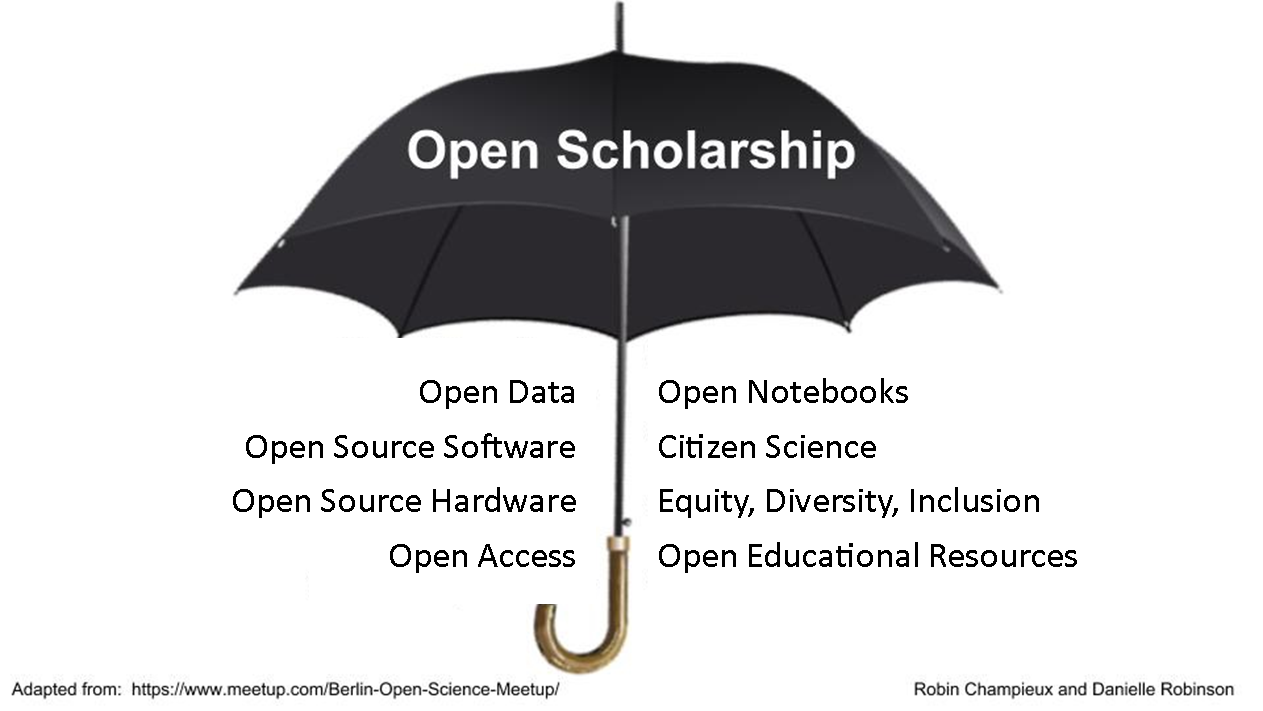Open research and its subcomponents fit under the umbrella of a broader concept - open scholarship.

Figure 1:Open scholarship is an umbrella term that includes open data, open access, and other elements.
Equity, Diversity, Inclusion [def]¶
Open scholarship means open to everyone without discrimination based on factors such as race, gender, sexual orientation, or any number of other factors. As a community, we should undertake to ensure equitable opportunities for all. We can go about that by deliberately fostering welcoming, inclusive cultures within our communities. For example, reasonable accommodations should be made wherever possible to include community members with disabilities to enable them to participate fully, and this can be as simple as choosing colourblind-safe colour schemes when making graphs.
Citizen Science¶
Citizen science [def] is the involvement of the public in scientific research – whether community-driven research or global investigations. The Oxford English Dictionary recently defined it as: “scientific work undertaken by members of the general public, often in collaboration with or under the direction of professional scientists and scientific institutions”. Citizen science offers the power of science to everyone and the power of everyone to science.
By allowing members of the public to contribute to scientific research, citizen science helps engage and invest the broader world in science. It also benefits researchers by offering human resources that would not be accessible otherwise. Examples of this include finding ways of folding molecules and classifying different types of galaxies.
Patient and Public Involvement¶
Whilst citizen science encompasses one way of contributing to scientific research, Patient and Public Involvement (PPI) is a far more specialized form of citizen science which is particularly useful when researching health or social issues.
PPI is not:
- Participation: Recruitment of participants (such as for a clinical trial or survey) to contribute data to a project.
- Engagement: Dissemination, such as presenting at patient interest groups or writing a blog post.
PPI is:
- Involvement: patients and members of the public contribute at all stages of the research cycle.
When incorporating PPI into research, researchers work with volunteers, rather than doing work about them. PPI volunteers are usually patients or members of the public with a particular interest in some area of research, which means that the topic is often very personal, and being involved in the research cycle can be an empowering experience. For the researcher, PPI often generates unique and invaluable insights from the volunteers’ expertise which the researcher cannot always predict.
It is a good idea to consider PPI very early in a project, ideally before any grant applications or submissions for ethical approval have been written. PPI volunteers can help researchers in many ways, such as the following:
- Generate or shape research questions.
- Contribute to, or review, study design.
- Help with grant applications or submissions to research ethics committees (particularly the lay summary).
- Collect data.
- Analyse data.
- Contribute to the manuscript and be listed as a co-author.
- Disseminate findings in plain English.
One of the most significant barriers to PPI is not knowing how to get started. The UK National Institute for Health Research has its own site, INVOLVE, to help familiarise yourself with the foundations of PPI. Additionally, charities related to your specific research field may be able to facilitate or support PPI; for example, Cancer Research UK and Parkinson’s UK have formal guides in place that provide a comprehensive overview of PPI.